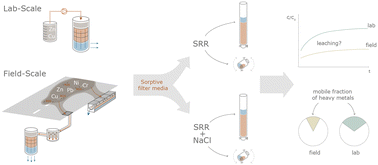The risk of heavy metal leaching from sorptive filter media in stormwater control measures (SCMs) treating road runoff is mainly assessed through lab-scale studies. In contrast, investigations with filter media prestressed under real conditions are crucial. Therefore, the leaching potential of five traffic-relevant heavy metals (Cr, Cu, Ni, Pb, and Zn) from field-scale and lab-scale prestressed sorptive filter media and road-deposited sediments (RDSs) from a decentralized treatment facility was assessed using quiescent batch leaching tests with and without adding de-icing salts. The hydraulic retention times of a maximum of 7 days should represent prolonged submerged conditions during dry periods. The leaching quantity order was Zn ≫ Cu > Ni, whereas no observed leaching was quantified for Cr and Pb for all tested materials. Considerable loads of Cu only leached from the field-scale prestressed sorptive filter media, which was mainly associated with the presence of dissolved organic matter. Regarding the tested filter media, zeolite and carbonate sand revealed significantly higher leaching of Zn under the influence of de-icing salts. The leaching of Cu and Zn concerning the mobile heavy metal fraction was less than 0.2%. The highest concentrations of heavy metals were observed for the RDSs, where up to 0.3% leached of the potential mobile fraction during one dry cycle.
